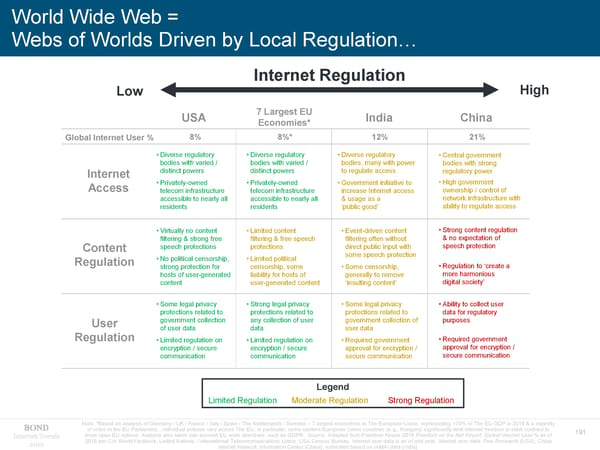World Wide Web = Webs of Worlds Driven by Local Regulation… Internet Regulation High Low USA 7 Largest EU India China Economies* Global Internet User % 8% 8%* 12% 21% • Diverse regulatory • Diverse regulatory • Diverse regulatory • Central government bodies with varied / bodies with varied / bodies, many with power bodies with strong Internet distinct powers distinct powers to regulate access regulatory power Access • Privately-owned • Privately-owned • Government initiative to • High government telecom infrastructure telecom infrastructure increase Internet access ownership / control of accessible to nearly all accessible to nearly all & usage as a network infrastructure with residents residents ‘public good’ ability to regulate access • Virtually no content • Limited content • Event-driven content • Strong content regulation filtering & strong free filtering & free speech filtering often without & no expectation of Content speech protections protections direct public input with speech protection Regulation • No political censorship, • Limited political some speech protection strong protection for censorship, some • Some censorship, • Regulation to ‘create a hosts of user-generated liability for hosts of generally to remove more harmonious content user-generated content ‘insulting content’ digital society’ • Some legal privacy • Strong legal privacy • Some legal privacy • Ability to collect user protections related to protections related to protections related to data for regulatory User government collection any collection of user government collection of purposes Regulation of user data data user data • Limited regulation on • Limited regulation on • Required government • Required government encryption / secure encryption / secure approval for encryption / approval for encryption / communication communication secure communication secure communication Legend Limited Regulation Moderate Regulation Strong Regulation Note: *Based on analysis of Germany / UK / France / Italy / Spain / The Netherlands / Sweden – 7 largest economies in The European Union, representing >70% of The EU GDP in 2018 & a majority of votes in the EU Parliament…Individual policies vary across The EU, in particular, some eastern European Union countries (e.g., Hungary) significantly limit Internet freedom in stark contrast to Internet Trends more open EU nations. Analysis also takes into account EU-wide directives, such as GDPR. Source: Adapted from Freedom House 2018 Freedom on the Net Report. Global Internet User % as of 191 2019 2018 per CIA World Factbook, United Nations / International Telecommunications Union, USA Census Bureau. Internet user data is as of mid-year. Internet user data: Pew Research (USA), China Internet Network Information Center (China), estimates based on IAMAI data (India).
 Internet Trends 2019 - Mary Meeker Page 37 Page 39
Internet Trends 2019 - Mary Meeker Page 37 Page 39